|

by Michael Moran
February 08,
2020
from
DailyStar Website
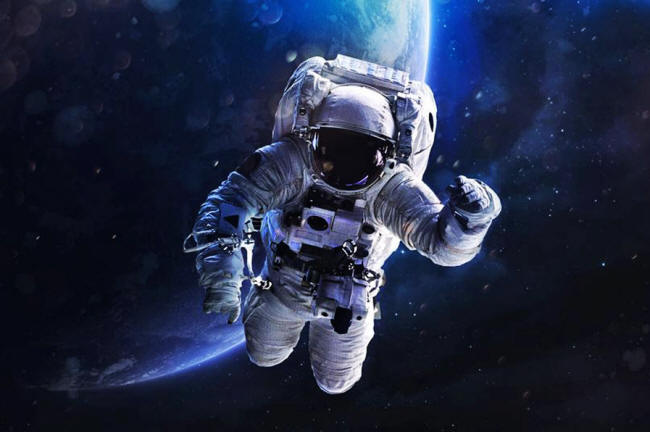
The first generation of astronauts were pilots...
but the
next generation will be tech billionaires
(Image:
Getty Images/iStockphoto)
The
very same Technocrats
who are running society and the physical world into the
ground are the first ones who want to get off the planet
as it dies from climate change, overpopulation, disease,
etc.
We
would have less problems if they would oblige.
The desire to reach the heavens is as old as the Tower
of Babel, and has been depicted in art and literature
for hundreds of years.
Now
that the technology exists to actually do it,
Technocrats are doing it.
Mars
is more inhospitable than the Sahara Desert in the
middle of summer, yet they deceive themselves that Mars
is preferable to living on earth.
Source
There's
growing speculation
that the trend
for billionaires like
Elon Musk and
Jeff Bezos
to research
space travel
is more than
just 'boys and their toys'...
it could be a
lifeboat to escape a dying Earth
Billionaires
could 'leave Earth behind for space colony' as 'climate collapses'
Lots of people would
leave this planet if they possibly could.
And maybe a few people can.
A number of multi-billionaires, ,
...have poured huge
chunks of their fortunes into space travel.
Maybe they're just squandering their unimaginable wealth on rockets
in the same way that mere millionaires might buy yachts.
But some people are speculating that the mega-rich might be planning
to flee off-planet.
In a New York Times article entitled
The Rich Are Planning to Leave This Wretched
Planet, Michael Suffredini, who is
spearheading the creation of a new "luxury" space station called
Axiom, revealed the details of his designer orbital habitat.
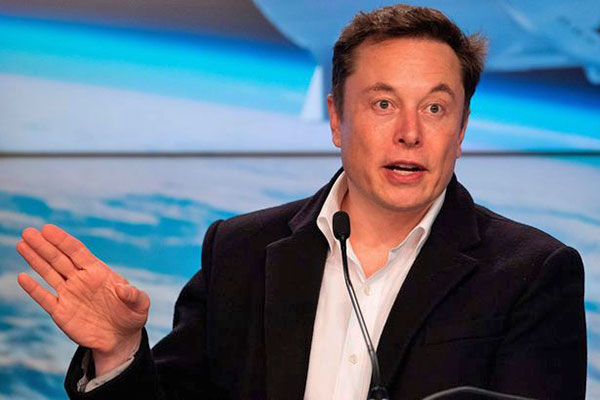
SpaceX chief Elon Musk
has
spoken many times of his long-term goal
to
establish a Mars colony
(Image:
AFP/Getty Images)
He predicted that,
a holiday on
Axiom would cost $55million,
and not only had he recruited world-famous French designer
Philippe Starck to create the station's interior but he was
close to doing a deal with a major European fashion house to
provide custom-made space suits.
He said that three people had already signed up even though the
space station had not yet launched.
The station is slated
to receive its first guests in 2022.
Elon Musk has made
no secret of his plan to establish a permanent settlement
on
Mars.
He has stressed the
importance of ensuring that humanity is a multi-planet species so
that there will be seem of us left behind if the worst should
happen.
Musk says:
"Last century, we had
two massive world wars, three if you count the Cold War."
While the PayPal
billionaire isn't predicting a global conflict any time soon, he
says:
"I think it's
unlikely that we'll never have another world war again."
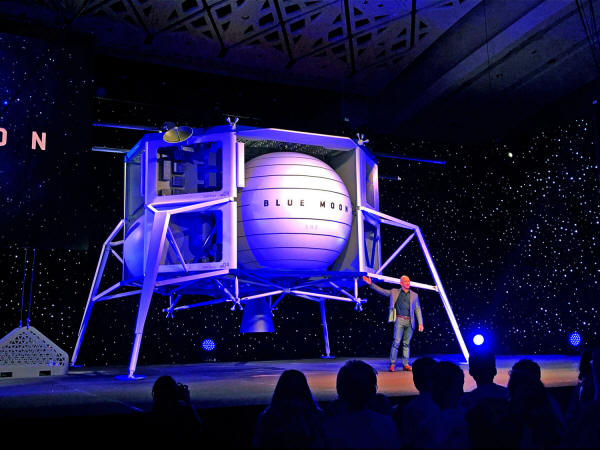
Bezos's space company Blue Origin
has teamed up with aerospace giants
Lockheed Martin and Northrop Grumman
(Source)
But noted American media theorist Douglas Rushkoff
has written that the overall
direction of technological development was about creating an escape
route for the super-rich.
He pointed out that combat robots would serve very well to guard the
bolt-holes of billionaires remaining on Earth once climate change
reached its end-game and described Elon Musk's planned Mars
colony as,
"less a continuation
of the human diaspora than a lifeboat for the elite."
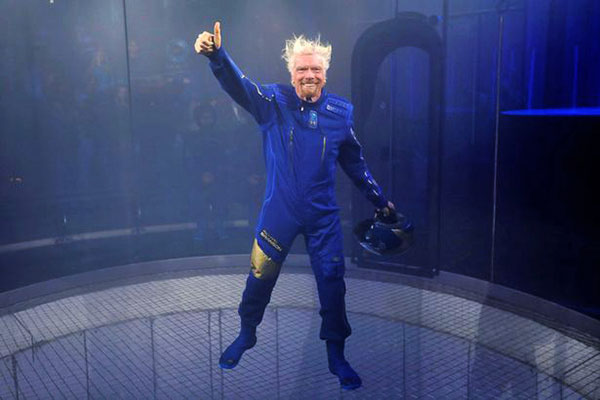
Richard Branson's Virgin Galactic venture
is currently developing new commercial spacecraft
(Image: REUTERS)
They can certainly afford a lifeboat.
The
world's richest people have seen
their share of the world's total money supply
increase from,
42.5% at the height
of the 2008 financial crisis to just over 50% by the end of
2017...
That adds up to about or
$140 trillion (£106tn), according to a report from
Credit Suisse.
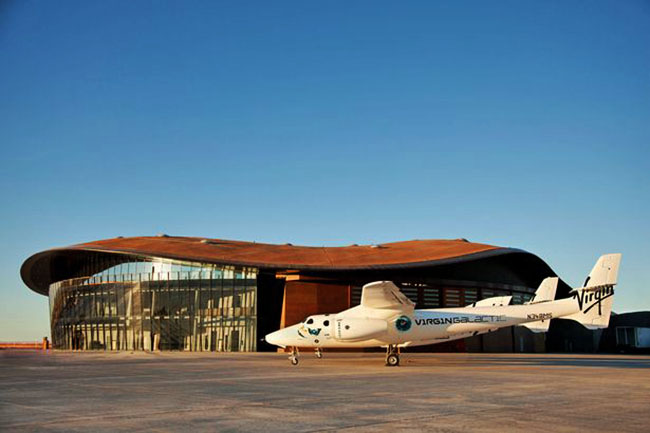
Richard Branson's
new
commercial spaceport in New Mexico
is now
'operationally functional'
(Image:
PA)
But how possible is
it to establish an off-world base?
We asked NASA's Cheryl Warner whether there were any serious
obstacles to developing
a Moon base with 'today's
technology'...
She told us:
"From a technical
standpoint, we're closer to returning to the Moon than ever
before, this time with modern systems that will provide more
access to the lunar surface, and allow us to stay on the surface
for longer periods of time.
"The White House previously asked us to accelerate our return to
the Moon, and we're working diligently to land the first woman
and next man on the Moon by 2024, and establishing sustainable
lunar exploration by 2028.
"Doing so will prepare us for exploration farther into the solar
system, including sending astronauts to Mars in the mid-2030s."
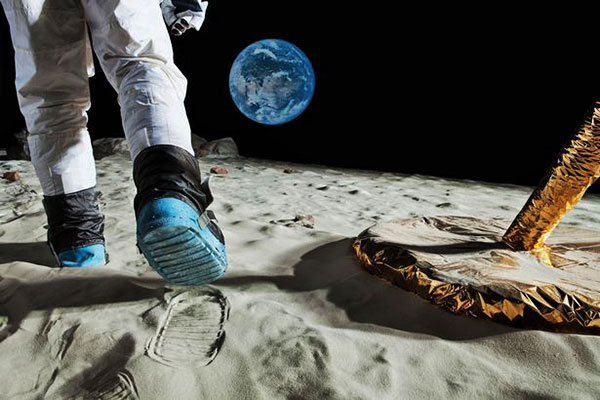
NASA have confidently predicted
that all the technology for
a permanent Moon base
is already in place
(Image: Getty Images)
The British Interplanetary Society's
Mark Hempsell told us that when
it comes to establishing a permanent orbital habitat the only
current stumbling block is the need to develop a replacement for the
Space Shuttle.
"The key new approach
that is required for any of this to happen is reusability," he
said, "and this is what SpaceX and Blue Origin are both
addressing.
"However, they are rather tiptoeing the issue. The approaches
they are using could have done 30 or 40 years ago."
"So I would argue the hold-ups are all political and economic."
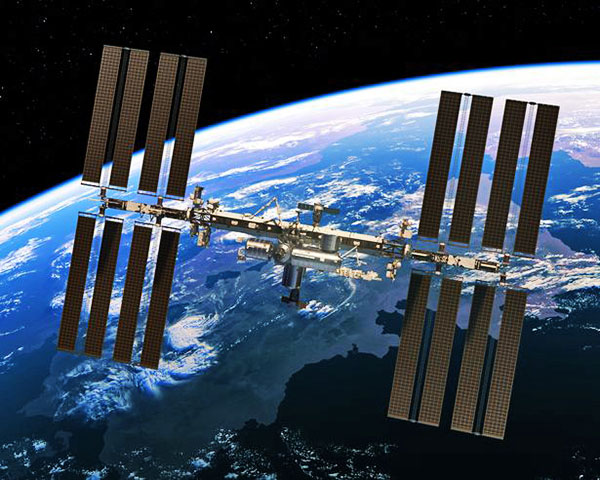
Click above image...
Russia's Valeri Polyakov
holds
the current ISS endurance record
with
437 days in orbit.
(Image:
Getty Images/iStockphoto)
Mark says that a UK-based launch vehicle currently on the drawing
board could ferry would-be colonists to and from orbit comparatively
soon, budget permitting.
He added:
"The studies I have
done have been centered on the British
Skylon, from Reaction
Engines.
"Those studies suggest Skylon alone can support significant
space colonization on an economic basis with no other launch
system required."
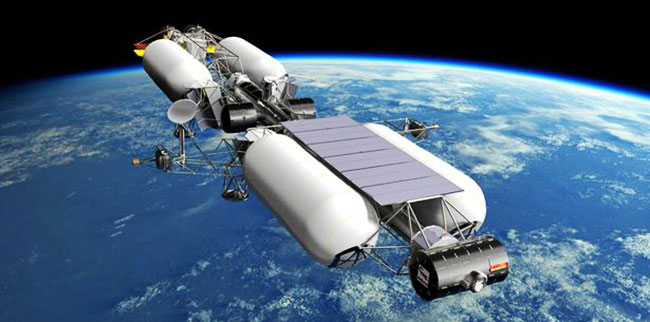
The nuclear-powered Scorpion concept craft
has
enough power to carry the radiation shielding
required for long space journeys
(Image:
British Interplanetary Society)
Mark believes that millions, potentially billions, could one day
thrive in orbital colonies.
He says that solutions for the problems of food and oxygen supply
are more achievable than many people imagine, but,
"less certain is the
impact of long term effect of the low gravity of either
Mars or
the Moon on the human body and that is an issue."
The effects of truly long
term exposure to a zero gravity environment aren't likely to be felt
on your body, or even on the bodies of trained astronauts, but on
the gym-honed tech billionaires with money to burn and a yearning to
explore the highest and wildest frontier.
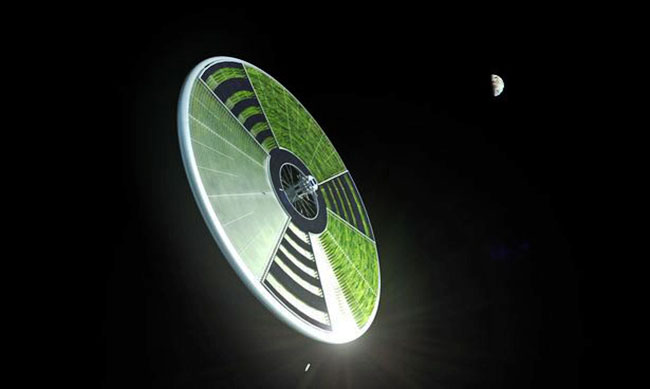
Mark Hempsell's Skyfarm concept
could potentially provide
food for 4 million people.
(Image: British Interplanetary Society)
Writing in The
Guardian, editor and journalist Jess Zimmerman
asked:
"By pushing outward
while ignoring the problems it causes back on the home turf, are
[tech billionaires] effectively creating a galactic upper class
that rests on the backs of the earthbound?"
Whether it's war, or
natural disaster, humanity is going to face a fight for its survival
in the coming century.
And the people most likely to escape that evolutionary bottleneck
are the very few who have the money to help them orbit high above
the disaster...
|










